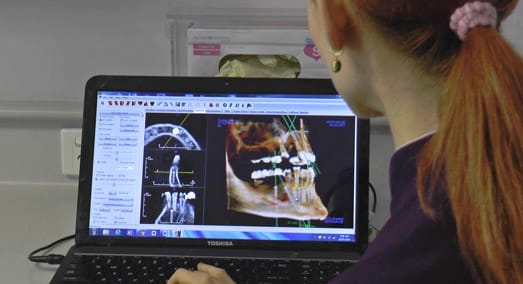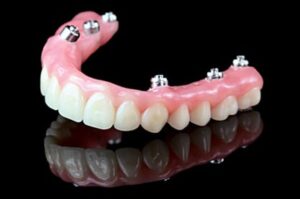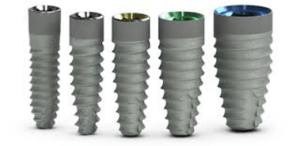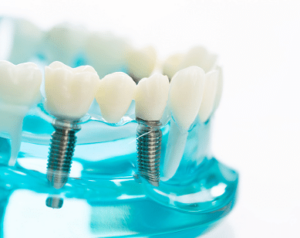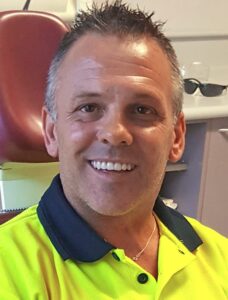Full mouth dental implants – the complete guide
So I’ve been meaning to create a guide for my patients who are thinking about having full mouth implants for ages, but I’m always so busy that I never get a chance to dedicate any time to it. I’ve even considered hiring a copywriter to do it for me, because frankly I’m not the best writer in the world.
As it turns out, time spent sitting at home in Covid-19 isolation and feeling like Ann Frank – provided me with time to ponder… So I will give it to you just the way it comes to mind… No fluffy adjectives… No sales pitches. Just the information that you need to know before you proceed with full mouth implants, the way I tell it to my patients… I will even throw in some pictures and paragraphs because it’s easier for you guys to process it. So let’s get into it.
What are Full mouth dental Implants?
If you refer to the diagram, it tells the story. But in my own words, it’s basically a series of screws stuck in your jawbone, which in turn are screwed to a piece of acrylic that’s been made to look like teeth. If it helps you visualise, they are analogous to Bunnings screws but made of grade 5 titanium. Let me explain.
If you stick a brick into jawbone, it will get rejected by the body, but for some 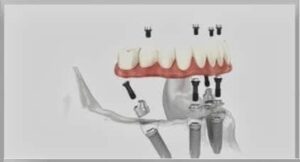
What are Teeth in 3 days or Teeth in 1 day?
These are catchy terms that all mean the same thing. Basically, from the time your natural teeth are removed to the time you get new temporary prosthetic teeth on implants, it’s anywhere from one to three days, depending of how quickly your dentist and technician work and deliver them to you.
What are immediate full mouth implants?
Besides a good marketing ploy, they’re the same as teeth in 1 day, the same as teeth in 3 days, or All on 4, or any other term that’s commonly used to describe immediate full mouth dental implants. The difference is in the terminology and not the product.
Essentially, the difference between immediate and conventional implants is that immediate implants get fixed with temporary teeth within a few days, while conventional restorative methods allow for considerable intervals between teeth removal, implant placement and the final fixed teeth. Sometimes the difference can be up to a few years. That’s quite significant, and that’s why immediate full mouth implants have gained popularity in recent years.
What is All on 4?
Besides another name for the same concept. Technically it means all teeth on four implants. This technique was initially pioneered by a Portuguese dentist by the name of Paulo Malo and the term All on 4 was subsequently trademarked by a Swiss implant company called Nobel Biocare. I must state that I am not promoting any particular brand of implants here. My purpose is to educate and make confusing language clear.
Nobel Biocare (All on 4) implants are great and there has been significant research published on the success of this concept. However, Nobel Biocare isn’t the only brand of implants that can be used to replace teeth. Any implant brand can be used, providing it satisfies the requirements of being a successful, well researched implant that offers the flexibility and versatility of parts. Which, by the way, are required for full mouth implant rehabilitation.
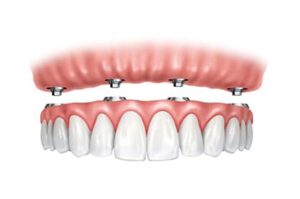
What is All on 6?
The same as All on 4 but on six implants, simple. I could end it there but there is a bit more to it than that. Four implants are the absolute minimum to support a full arch implant restoration. However, if one implant fails, the whole structure comes crashing down like Humpty Dumpty off the brick wall. This is because three implants aren’t adequate to support a fixed implant bridge.
However, if you have six implants, and one or even two don’t integrate or perhaps they develop a problem down the track, your teeth restoration can still be adapted without too much trouble. More implants, means more support and more security for the long term prognosis of your implants.
Advantages of Full mouth Implants
These are self explanatory! Your will be able to eat! Yay! After years of toothaches and eating mashed potatoes and cutting up apples into small bits, or having dentures which rock in your mouth, just imagine what it would be like to bite into a sandwich. I can list a series of technical advantages of full mouth implants but this is the main reason why 20 million people around the globe opt to go under the knife each year.
How do Full arch implants compare to dentures?
Like day and night! Studies show that full dentures deliver about 15% of your natural chewing ability, and implants are pretty close to your natural teeth. To put it simply, implants don’t move in your mouth like dentures do. To somebody who has been wearing full dentures for years, I don’t need to explain this. I see two advantages to full dentures – they don’t require surgery and they are cheaper. That being said, it’s for you to weigh up all the pros and cons and to decide which option suits you best.
Are full mouth dental implants right for you?
If you’re a living, breathing person, who has lost all or most of your teeth to decay (caries) grinding (nocturnal bruxism), or your teeth are waving in the breeze due to periodontitis (gum disease), you’re probably a candidate. Provided you are committed to turning over a new leaf and caring for your new implants daily at home. Later I’ll discuss a few more considerations relating to your general health and smoking. So stay tuned.
Success rates
Once again, I can list glorified statistics here and tell you that this treatment carries 90 – 95% success rate over 10 years. Success of what? Success of implants integrating? Or success of them not failing months or years down the track? Or success of acrylic teeth not breaking? Or you being happy with the outcome and aesthetics many years down the track? Or implants not developing problems? There are many factors to success, so these statistics are only semi- relevant, and truth be told, if we factor many variables into the equation, success rates would be lower. Let me put it in simple terms. Most, but not all, implants integrate and last.
Let’s just use common sense, implants don’t take every single time. If well positioned by the surgeon and well maintained by you, many of them remain integrated years down the track. But again, we have to be realistic here. Implants are designed to replace missing teeth not just teeth. Your natural teeth have the highest success rate of all!
Is this for life?
Maybe… Implants are just as permanent as anything else in life. Your permanent set of adult teeth are not permanent, that’s why you’re reading this. Again, if well planned and skilfully positioned by the surgeon, and well maintained by you, they might last a lifetime. But there are no guarantees in life. Same applies to dental implants.
Is the brand of implant important?
No, it’s not the brand name that’s important but more the versatility of it’s components, good design of the implant and a company that supports their product with attentive post sale care. A company that stands by its product in case there is an issue, is a much more valuable aspect of the implant brand than the name. These days, many implant companies produce excellent implants so it’s not worth getting bogged down with flashy online marketing campaigns. If anyone tells you that their implants are the original or the best, be aware that this is a marketing ploy.
Contraindications
Not everyone should have full mouth dental implants, even if you are sick of your teeth. Why?
- If we can save your teeth, please don’t try to convince us otherwise. If we are recommending a quicker, cheaper and more effective treatment option for you, it’s in your own best interest. There is nothing better than your natural teeth. I understand that you might’ve lost all faith in them and they’ve given you trouble over the years, but if there is a good chance that we can save them, take that chance. I am happy to educate you and show you how to look after them and maintain them at home. Replacing your teeth is the next best thing after keeping your own.
- Growing children. Some rare genetic conditions can result in young kids missing their natural teeth. We would need to wait until they are adults to have their teeth replaced with implants.
- Smoking can impair healing and thus, people who smoke have lower success rates with implants in the initial phase of healing, as well as in the long term. This doesn’t mean that you cannot have implants, but it’s best to quit smoking at least two weeks prior to surgery. I understand that this is easier said than done. However, we can discuss strategies to assist you with this as well as prescribe medications you can take to help.
- Uncontrolled diabetes can also interfere with healing. However, if you work with your medical doctor to get it under control first, you would be perfectly suitable to have dental implants.
- Certain systemic conditions such as Leukaemia, radiotherapy, chemotherapy can again impede healing, and thus, it’s not advisable to have oral surgery until you’ve recovered.
- Some medications such as bisphosphonates slow down bone healing, and again would require careful consideration before committing to implants.
- For some candidates, who don’t have adequate bone and require sinus lifts and bone grafting to even be able to place implants, full arch immediate implants aren’t the best approach. Delayed or staged approach is more appropriate, which means that you get to the same end result but slower. Teeth are removed first, followed by bone grafting, which is in turn followed by implants. With at least a few months between each stage, you would appreciate that this process would take longer than if bone grafting was not required. This is not a contraindication as such, just a variation to the immediate approach.
- If a dentist determines that there is not enough bone in your mouth to anchor implants. Bone grafting could be considered in your situation before implants are placed.
Risks and complications:
Any surgical procedure will carry risks and complications.
Minor and common post-operative complications include:
-Swelling, bleeding, slight pain and bruising of the face – you will not want to be seen in public so plan to have at least a week off work. I prescribe a series of medications to reduce the swelling and pain. People surprise me when I see them the following day by saying that they have no pain. However, some people experience more discomfort than others depending on how extensive their surgery was and their level of tolerance.
– Incision line opening – this is jargon for wound opening – usually if it’s attended to promptly, it doesn’t cause any serious long-term problems.
-Infection – this would be very common if it wasn’t for the antibiotics we prescribe. They minimise the chance of any post-operative infections. However, with the emergence of superbugs, this complication is still possible and needs to be managed by your surgeon. You will also be advised to rinse your mouth with chlorhexidine mouth rinse for two weeks after surgery.
-In the upper jaw, unless you are having zygomatic implants, there aren’t any nerves in the vicinity so there is no risk of nerve damage). However the sinuses, which are air filled cavities in your face, are nearby. An implant can sometimes penetrate this sinus space. This often doesn’t cause any long-term complications but on a rare occasion can cause sinus infections, in which case a follow up procedure might be required to alleviate this situation, or you might even be referred to an ENT specialist.
-other less serious complications of the prosthesis, which are more like maintenance issues rather than complications could include fractures of the teeth etc. These can be repaired and I will discuss it later.
More serious complications:
-Implants not integrating – this upsets us all, but it’s not the end of the world – your surgeon will have to make a decision whether to remove the implant and start again or if it can be saved. This complication can prolong the length of the treatment as well as possibly increasing the cost.
– In the lower jaw, there is a nerve, namely the “Inferior Alveolar Nerve”, that’s responsible for supplying sensation to the lower lip, the chin and the teeth. There is one on each side of the jaw. Occasionally through grafting or implant placement, this nerve is temporarily or permanently affected, resulting in altered sensation in the lip and chin on the corresponding side of the face. This could feel like minor tingling, which can sometimes improve over time, or a permanent loss of sensation (numbness) can ensue. It’s worth knowing that with this complication, there is no loss of function, so your lip will not droop and no one will notice the difference. You will be the only person who knows about this, and of course your dentist should too, as soon as you suspect this might’ve happened. Your surgeon will make an assessment and will advise you on the best way to manage this. This is one of those rarer complications, but not to be dismissed. In fact, most people who have their wisdom teeth removed would’ve been informed of this complication by their dentist.
– Delayed problems with implants can arise too, especially if you are a smoker or have uncontrolled diabetes or you’re on bisphosphonate drugs. You might develop a condition called peri-implantitis which is still not well understood and thus has limited treatment options, although this area of science is evolving. As a result you might lose bony support around your implants in a similar manner to what would happen to a natural tooth with gum disease (periodontitis). Both the skill of the surgeon as well as meticulous home care of your implants can minimise the risk of this condition. But remember, if mother nature hasn’t designed your teeth to last for life, the money you spend is unlikely to alter this fine balance between nature and the magic we do.
How should you choose a surgeon for full mouth implants?
It’s really important to pick a skilled, experienced dentist but it’s also important that he or she is kind, compassionate and cares about the outcome, because what better joy is there for a surgeon than to see new life injected into their patient? You want your surgeon to hold their breath when they are doing it. No matter how experienced, they need to be transparent, honest and be invested wholeheartedly. A recommendation from a friend is worth gold but if you don’t know anyone who’s had this done, perhaps meet a few surgeons to see how comfortable you feel with them. The gut feeling often tells you who to go with.
Surgery is not a walk in the park. When you undergo surgery, please remember this. Hopefully you will be one of 9 in 10 for whom it all goes really well, rather than 1 in 10 who’s implants develop complications.
It’s not all up to the surgeon but many factors are.
What to expect?
There is no miracle dentistry. You will have to be toothless overnight and expect to at least be a little bit swollen or even have bruising on the face. I’m not joking, this is normal. Expect to see us often: several times after the initial consultation for planning and preparation, and at least monthly after the surgery for follow ups for about 5-6 months, until your treatment is complete. We’ll either love or hate each other after this process, and I will miss you for about 6 months after, until you run back into my arms for your 6 monthly check up.
When can you eat?
Although you will have something that resembles teeth pretty much overnight, your gorgeous new pearly whites are not for eating but only for smiling. Well, just for three months until implants integrate, you’ll have to eat mush. Mashed potatoes, mashed bananas, and after three months you can add steamed vegetables etc. for another two months. Wait, but guess what’s in store for you after five months? Lasagne, pizza, apples, sandwiches… All the things you wanted to eat for years. Now you can! The only word of advice I have for you is to go easy on hard carrots, nuts, biscuits and crust with your front teeth. And never, ever open another beer bottle with your teeth! It’s best to cut hard foods up into smaller bits, and bypass the front teeth altogether. It’s the same advice I give patients with fillings in their front teeth. Modern materials are good but not perfect.
How long will the whole process take?
Provided that we’ve determined that you are suitable for full mouth implants, for most patients the average time it takes from the beginning to completion is 5-6 months. However, if bone grafting is required, this could add another 7-9 months to the duration of your treatment.
More on the process
Ok, so to sum it up, here are the steps at our practice:
- Initial consultation to discuss your concerns and requirements as well as the time frame and treatment options. The dentist will begin his or her investigative process and will assess your current situation.
- Scan (Cone Beam CT) to assess the volume and density of your jawbone and suitability for full mouth implants
- A series of appointments which include photographs, impressions of your mouth as well as the preparation of your immediate teeth
- Surgery – a qualified anaesthetist will administer general anaesthesia. You will have a relaxing day asleep while we work away removing your remaining teeth, inserting new implants and taking measurements for your new teeth.
- New teeth – Voila! You will go home overnight and return the following day for your new but temporary teeth. This is exciting! Very exciting for all of us. We attach an acrylic bridge to your new implants and now you can go home smiling.
- Recovery – the mouth heals surprisingly quickly, and provided you follow our instructions and take your medications, it usually happens uneventfully.
- Suture (stiches) removal – you return in two weeks to have your sutures removed.
- You will need to see us on monthly bases for quick reviews to make sure healing process is proceeding well
- New bridge – in about five months, provided your implants have integrated with the jawbone, it’s time to make you a new, final bridge. Again, we’ll see you several times to take measurements and try your new teeth in to make sure they not only fit and suit your face but also that you are happy with them.
- Maintenance and care. Please care for your implants and your new teeth like you would for you most precious possession, and visit your friends at the dental office once every six months for check ups and cleans.
How to prepare for the surgery?
If you have opted for general anaesthetic, you will need to fast seven hours prior, wear comfortable clothes on the day, and arrange for somebody you know and trust to drive you home as you will be sleepy after general aesthetic. It’s advisable to take at least a week off work so that you can recover in the comfort of your own home.
Cost of Full mouth implants
Cheap is good. I like cheap too. When I go to the supermarket and see a discounted bruised apple, I’ll buy it. So don’t think that your money goes to buy the most expensive apples. I can cut a bruise off that apple and then I have a good apple. I also like cheap tissues – my nose doesn’t mind. But I don’t want cheap teeth to eat that apple with….
You only get two chances in life when it comes to your teeth. The first set is the one that you were born with, which came for free, and the second set will be your last chance and it will cost you. A lot. But if you mess this up, you will most likely not get a third chance. So full dentures will be the only option left. Implants are not easily removable and even if they are, they leave such a deficit in your jaw that it might not even be possible to have another go. And even if it is, it will cost you many more thousands of dollars to repair the damage. No one can really predict the consequences. So, I can’t stress enough that cheap surgery is at your own risk.
The average price of full arch implants in Australia is $23,000 – $27,000 per arch.
Good advice is free but cheap implants could cost you for the rest of your life.
Your natural teeth are the cheapest. Look after them. If you like, I can show you how.
The difference between $13,000 and $25,000 full mouth dental implants
As much as I’d like to be informative, I’m not sure I’ll be too helpful in answering this question. I see many websites advertise full mouth implants “from $19,000” or even “from $13,000” and I wonder how they do it myself. Sometimes I want to be a fly on the wall to understand the truth. Perhaps the word “from” is the key, but when you actually choose all the necessary “add ons” that we just include in our standard price, it’s unlikely to be $19,000. Perhaps, you are simply not getting what you would for $23,000 in terms of materials used. How is it that 99% of dentist will charge an average fee and 1% with charge half of that? Perhaps it is too good to be true? What sorcery do they possess that others don’t?
Making the first step towards having this procedure is daunting. I encourage everyone who is contemplating it to get a few opinions. Please satisfy your curiosity first and consult a few dentists who are offering this service. Compare apples with apples when you are making the decision. This can be difficult sometimes, as dentists use item numbers and codes. If you are confused, please don’t hesitate to give us a call and we can help you clarify what they actually mean, so you can make an educated decision as to who is the right dentist for you.
Every person who is involved in the designs, construction and installation of your new teeth needs to be an expert. Experts constantly keep abreast of new research and technology. They have done the procedure many times and they know what’s involved and how much it costs to provide the service at a standard that keeps you happy, and also offers you post-operative care in case of complications. After all, their reputation is at stake. Thus, they want to be fairly remunerated for their effort, and will provide the service at a fee that reflects real costs.
At the same time we understand that it’s not cheap for you, so we try to find a way to make it as cost effective and affordable.
Why do dental implants cost so much in Australia?
Unless you want us to import an unqualified nurse from a third world country, operate from our backyard, and have our staff work for peanuts and use cheap materials, expect that this treatment will cost you. It takes at least 6 months to complete, with approximately 50 hours of work involved for the team and about $10-$15,000 in componentry. It is not subsidised by Medicare like cardiac surgery. Dental insurances want to wipe their hands of it too because every business is in for a profit. You are better off saving up than having this done on the cheap.
How can you afford implants?
- You’ve inherited cash or you were born into money
- You work hard and save up like most people do
- You can take out a payment plan that’s specifically designed for medical treatments. This is good if you need implants now but happy to pay them off for 24 months. However, be aware of hefty interest rates incorporated into these plans. Sometimes up to 17%. I advise my patients to explore all options. Perhaps a bank can offer a better deal.
- You might be able to access your superannuation on compassionate grounds. Your GP or your dentist can help you through this process. You can read up on this on the ATO website https://bit.ly/3ahM5O3
How much will dental insurance pay?
Don’t expect much. Dental insurances will pay a bit for you check ups, fillings, crowns etc. But when it comes to dental implants you might get $1,000 – $2,000 back. Seems unfair after all the money you have paid them over the years. I agree. But if insurances pay for 15 – 20 million implants which are being done all over the world annually, they wouldn’t be in business. So you get my point? It’s cheaper to save on the premiums and pay for implants out of pocket. It works out better for you in the long run.
Does Medicare pay anything on dental implants?
Nope. Nil. Zero. Zilch. However, you will get a Medicare rebate on your general anaesthesia service if you opt for it.
Can you be asleep during the surgery?
Absolutely. Discuss this with your dentist. Most implant procedures can be done under local anaesthetic but with full mouth implants, being a more involved surgery, I advise to do it under general anaesthetic. It’s not painful but you will be more comfortable asleep for hours while implants are being placed. Believe me, you will have enough to deal with when you wake up. The cost of general anaesthetic will set you back approximately $2,500 – $3,000 out of pocket but it’s worth every penny.
Is it painful?
If I told you that it’s not painful, you probably wouldn’t believe me. The most common demographic of people I see who require full mouth implants are people who have a dental phobia. They are often terrified to even sit in the dental chair at the beginning but by the end of the process, they jokingly tell me that they’ve been cured from their fear. Really? Surgery cures fear? Well, that’s what my patients tell me.
They don’t usually call me at night in pain wondering how to fall asleep. So I guess I have to believe them.
So what’s our secret? Medications! We are so spoilt with modern medicine. A combination of non-steroidal anti-inflammatories, short term corticosteroids and antibiotics work a treat. These medications keep people comfortable and sleeping well at night. They’re not so good that you would want to come back for more… but almost.
Should I have Implants done Overseas?
At your own risk. There are good surgeons all over the world, and you might get lucky, but what if you develop a complication after the surgery while you’re on the flight back to Australia? Who is going to help you then? Also, there are over 500 implant brands all over the world, most of which are not TGA approved in Australia. So, if you go to a dentist here, he or she might not be able to source parts for your implants. Custom made parts can be manufactured but at a cost.
Too many times I’ve tried to help patients who’ve had implants done overseas. We try to request implant specifications from the dentist who’s placed them, but they simply don’t reply.
One has to understand the many variables in implant surgery. Only if it were like putting a screw in the wall… Bone volume, bone density, general health, genetic predisposition to gum disease, grinding, aesthetics and functional requirements just to name a few. From the beginning to end, implant process can take many months to even years to do properly. This could include bone grafting, and a staged approach with implants to ensure long term success. What do you think a dentist overseas is likely to tell you if you tell them that you are on holidays for three weeks? You get the point? They will find a way to accommodate you….
Even if you go to a country like Germany, Japan, Israel, Sweden or Switzerland that all have very high standards of care like Australia, unless you go to live there for 6 months, it’s just not possible to complete the process properly while you’re on holidays. By the way, cost for full mouth implants in those countries is analogous to Australia.
Unarguably, Australia has one of the highest standards of care in the world. Training of dentists in third world countries is not standardised like it is in Australia, so dental surgeons around the world have varied skills. Neither do third world countries have a watchful eye from a regulatory body such as AHPRA (Australian Health Practitioner Regulatory Agency), who protects the public from malpractice and sets our standards at a very high level.
From my personal experience, I’ve seen some patients with success stories with implants done overseas, and I have also seen some very serious complications. Perhaps, my observations are biased because only people with problems seek help. I have seen many people in a difficult situation with implants placed in a suboptimal position, failed implants due to a short term approach taken by the dentist and broken prosthesis. These problems can happen in Australia too, but at least the dentist who’s done them is likely to try to help you, and perhaps I don’t see many people with serious problems from Australian dentists.
Factor in flights, accommodation cost, living expenses while you are away and potential loss of income as well as other non monitory considerations. Then you can calculate if it works out cheaper.
So before you make any decision, ask yourself how much risk you are prepared to take and at what cost?
What are the prosthetic options
Acrylic teeth reinforced by titanium framework – this is the most common and cost effective option for most patients. Titanium is super strong and durable but acrylic is not. Teeth and gums on this prosthesis will wear and chip the quickest but inexpensive to repair (a few hundred dollars). Your acrylic teeth might break and will need to be replaced at some point. This could be 7-15 years down the track, so plan to rebuild or repair your bridge in the future.
Zirconia bridge – these teeth are stronger but heavier to wear. If they chip, oh boy, will you pay a few thousands for a repair.
Metal fused to porcelain – agha! You like you Rolls Royce! If you have the money and appreciate the finer things in life, the red carpet will be rolled out for you. You will smile into your grave with the most expensive teeth on the planet. Like a king or a queen, who, many years ago, were the only people able to afford false teeth. But this bridge is close to unbreakable as you can get. Will anyone complement you on spending extra $30,000 on it? Not really. They’ll still ask you if you’ve had a new haircut, before they notice the difference between one of the previously mentioned options. But you will put James bond to shame with your new teeth.
Maintenance
It worries me when people take out loans, access their superannuation and spend their last penny to have implants, but they continue to smoke and don’t look after their implants at home. Even if you are the richest person in the world and choose the best surgeon, nothing will save your implants if you don’t attentively care for them as your surgeon shows you. It makes me upset to see the health of implants deteriorate for preventable reasons. I feel helpless in assisting.
Here is a short video on how to care for your full mouth implants – they are similar to you natural teeth. Brush and floss. Brush and floss.
https://www.youtube.com/watch?v=FarOaqF-x1o&t=8s
Warranty
Implants are expensive and because they are, they should be guaranteed. Right? Because we pay so much for something, we naturally associate it with longevity and durability. Implants are well researched and are a sound, modern technology to mimic nature. Every time I do them, I pinch myself thinking of how incredible this technology is, and how lucky we are to live in a time when this equipment is available. Think about it, we are yet to create bionic legs and arms that function like your own… but we have teeth that do! We should not forget how far prosthetics have come. They are indeed functional and durable and can be lasting. However, when it comes to a human body, and we think of guarantees for surgery, I say to my patients that I can guarantee implants as much as a surgeon can guarantee the removal of cancer. But I can also guarantee that I will do my absolute best, and you have to guarantee me that you will look after what we’ve created together.
Perhaps save this on you wallpaper; “Success is determined by correct treatment planing, skill of the surgeon, health of the candidate, good home maintenance and chance”. If we can tick most of these boxes, we are on the right track to a warranty.
Conclusion
I can provide you with the most descriptive adjectives in the world, and tell you that our clinic is the best. Blah.. blah… But in reality some other clinic most likely has nicer chairs in the reception. If you want, I can help inform you so that you are well equipped to make the best decision for yourself. I can even do it for you because I’ve preformed hundreds of these treatments, and I can also just give you advice – for free. But I can’t do your surgery for free.
I’ve placed many implants and have seen hundreds of people’s lives transformed with full mouth implants. I’ve seen patients laugh and cry and I have laughed and cried with them. I’ve seen successes and I’ve seen failures. But when I ask my patients if they would do it again, not a single one says “no”. Not a single one has regrets about the many visits to see us, the bruises, the swelling, the concerns, or even robbing the bank to have it done! Not a single one! That’s how much of a miracle full mouth implants are.
Of course we want you to come and meet us to discuss if we can help you and you can help us. Because we’ve set up a mini hospital especially for this purpose, here in Prahran, Melbourne. Because we’ve dedicated our careers to learning and refining our skills so that we can be the best people to walk this journey with you. Because with every triumph, our hearts sing and we take pride in every smile we create.
And lastly, I’d like to share with you some before and afters of people who I can never forget. You might look at them and see an instantaneous transformation, and even imagine yourself in their shoes. But when I look at them, I am reminded of why I wake up in the morning to face another challenging day. I am reminded of every trial and tribulation…. Of every triumph that led to where these people are today. Every time I see them come back for their 6 monthly check ups beaming at me, I am grateful that they have put their trust in me, and we have achieved little miracles together.

